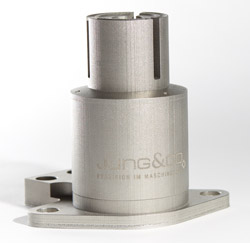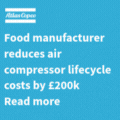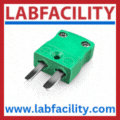
Posted to News on 23rd Dec 2016, 11:06
3D metal printing of spare parts on demand for drinks industry
3D metal printing provides an excellent option for the rapid manufacturing of spare parts in multiple industry sectors. Based in northern Germany, Jung & Co Gertebau GmbH specialises in stainless steel, titanium and aluminium parts, and relies on additive manufacturing (AM) to ensure availability of spare parts to beverage filling plants as quickly as possible. The company's focus is to improve and sustain customer relationships by employing the latest technology, including moving to the next step in additive manufacturing. Thomas Lehmann, Managing Director of Jung & Co, collaborates with technology pioneer Concept Laser.

Jung & Co provides high-quality, fast-turnaround manufacturing and efficient production planning for customers across various industries ranging from food, pharmaceutical and chemical engineering to aerospace. The company's experience and familiarity with the pressures experienced in fast-moving consumer goods markets, where high production throughput rates are vital to maintaining the supply chain, make Jung & Co a reliable partner for the supply of spares, components and assemblies.
The food and beverage industry is under pressure to keep up with production rates of around 40,000 to 80,000 cans or bottles per hour; if, for example, a filler valve on a machine should fail, it can cause a major loss of production. Waiting for the spare part to be manufactured and replaced could take days or even weeks - and only then can production resume. Depending on the size and output of the entire filling line, an hour of lost production may cost from EUR4000 to EUR30,000, not to mention the stress caused and impact on other machines.
Additive manufacturing of spare parts
3D metal printing is playing a huge part in selling the concept of additive manufacturing to customers in these industries. With 3D metal printing, a component can be manufactured separately or as a whole within a week - whereas traditional methods would require 8-10 weeks - allowing resumption of production as soon as possible. Thomas Lehmann says: "3D metal printing enables short downtimes, and rapid availability saving customers time and money."
For example, a filler valve can replace a conventionally manufactured part, made up of multiple components. Owing to the demands of pressure and load on the valve, the replacement part, made by 3D printing, must be thoroughly tested to prove that it can replace the function of the original. The part can be manufactured on Concept Laser's M2 cusing Multilaser machine, resulting in a component produced directly from CAD data being manufactured promptly as a single item with no assembly work required. Thomas Lehman says: "The finished 3D part not only looks different to the conventional one, but is also 35 per cent lighter." AM's capabilities are vast and, in a short time, parts can be manufactured and fitted in the factory. Customers are considering this method as a step forward, potentially revolutionising the longevity of equipment and boosting reliability in production.
The technology used in this novel application is available from ES Technology, Concept Laser's supplier in the UK and Ireland, and a manufacturer of machinery for additive manufacturing in a range of metals including titanium, aluminium, cobalt chrome, stainless steel, gold and silver. Go to www.estechnology.co.uk for more information.




